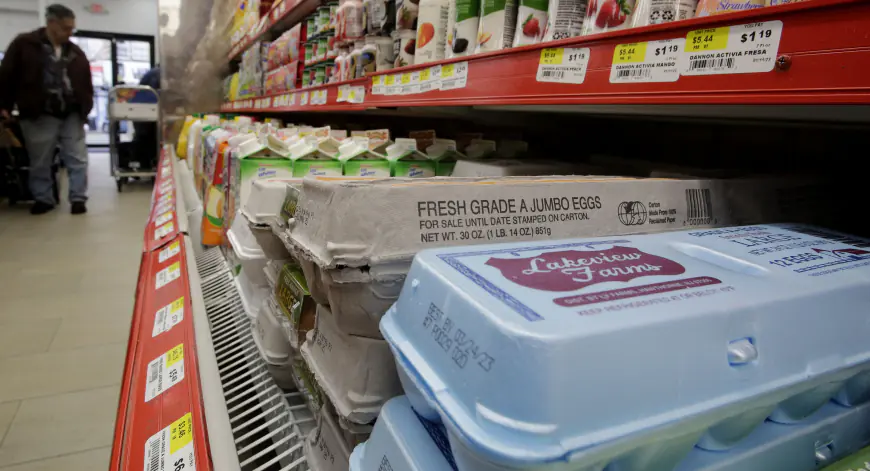Bird flu's Illinois impacts include higher egg prices, warnings for pet owners
As highly pathogenic avian influenza, or bird flu, continues to spread, experts say Illinoisans are feeling its impacts even without any human cases in the state. H5 bird flu is widespread in wild birds worldwide and is causing outbreaks in poultry and U.S. dairy cows. There have been 66 confirmed human cases in the U.S. with several cases tied to dairy and poultry workers, according to the CDC. While none of those cases have been reported in Illinois, residents are still being urged to take precautions, and impacts are certainly being felt in the state. Cats are more susceptible to becoming severely ill than dogs, according to Stephany Lewis, at the University of Illinois College of Veterinary Medicine. “If you have an outdoor cat, make sure you are keeping them indoors. If you have dogs, make sure you are monitoring them outside,” she said. Lewis says dogs and cats should avoid contact with sick or dead animals, wild birds and poultry. “Our recommendation is to not feed them any raw diets. Even some of the commercially made raw diets have been associated with avian influenza cases and even death in some domestic cats,” she said. Pet owners should look for symptoms including fever, lethargy, tremors, or respiratory issues and seek veterinary care immediately. Lewis also recommends people with backyard poultry restrict free roam, cover enclosures and line them with hardware cloth to keep out rodents, which can transmit the disease. “Influenza is famous for its ability to mutate. It can adapt to different host species really, really easily,” said Lewis. As the bird flu outbreak continues, the average cost of eggs has also skyrocketed. In December, the USDA reported over 18 million birds were affected, with the average typical cost for a dozen eggs jumping 60% over the last year. In a statement to NBC 5, the American Egg Board says the volatility reflects many factors, with prices driven by supply and demand. “The national egg supply has been tight due to Highly Pathogenic Avian Influenza—also known as HPAI or bird flu—which is devastating to egg farmers. In the U.S. we’ve lost about 40 million laying hens this past year to bird flu. As a result, some retail locations and different parts of the country are experiencing intermittent shortages. At the same time, the volume of eggs sold at retail has been up year-over-year for 21 consecutive months, and we’re just coming out of the highest demand season of the year—the winter holidays—when eggs sales increase significantly due to holiday baking and entertaining. These two forces combined—tight supply and high demand—are directly causing the spike in prices we’ve seen recently. The good news is that egg farmers are extremely resilient, and our farms are recovering faster. Keeping their birds safe and healthy is every egg farmer’s top priority, and they are working around the clock to protect their birds, replenish supply and keep those eggs coming. While we are all feeling the pressure of increased costs in food, eggs remain a great value among healthy proteins available today. A dozen large eggs amounts to 1.5 pounds of one of the highest quality, most versatile proteins you can find in the grocery store.” Although more expensive, experts advise eating eggs is still safe. “As long as poultry products are properly cooked, there is no concern,” said Lewis. Human infections are rare, and there have been no documented cases of human to human transmission. The CDC considers the public health risk low, but says it’s “watching the situation carefully and working with states to monitor people with animal exposures.” “What’s a little bit more unique about H5 [Bird Flu] compared to the typical influenza A, that is very common right now, conjunctivitis or red and itchy eyes,” said Dr. Jonathan Martin, an infectious disease physician at Cook County Health. “If you are sick and believe you have influenza, at this moment, it is very likely it’s just typical Influenza A,” said Dr. Martin.

As highly pathogenic avian influenza, or bird flu, continues to spread, experts say Illinoisans are feeling its impacts even without any human cases in the state.
H5 bird flu is widespread in wild birds worldwide and is causing outbreaks in poultry and U.S. dairy cows. There have been 66 confirmed human cases in the U.S. with several cases tied to dairy and poultry workers, according to the CDC.
While none of those cases have been reported in Illinois, residents are still being urged to take precautions, and impacts are certainly being felt in the state.
Cats are more susceptible to becoming severely ill than dogs, according to Stephany Lewis, at the University of Illinois College of Veterinary Medicine.
“If you have an outdoor cat, make sure you are keeping them indoors. If you have dogs, make sure you are monitoring them outside,” she said.
Lewis says dogs and cats should avoid contact with sick or dead animals, wild birds and poultry.
“Our recommendation is to not feed them any raw diets. Even some of the commercially made raw diets have been associated with avian influenza cases and even death in some domestic cats,” she said.
Pet owners should look for symptoms including fever, lethargy, tremors, or respiratory issues and seek veterinary care immediately.
Lewis also recommends people with backyard poultry restrict free roam, cover enclosures and line them with hardware cloth to keep out rodents, which can transmit the disease.
“Influenza is famous for its ability to mutate. It can adapt to different host species really, really easily,” said Lewis.
As the bird flu outbreak continues, the average cost of eggs has also skyrocketed.
In December, the USDA reported over 18 million birds were affected, with the average typical cost for a dozen eggs jumping 60% over the last year.
In a statement to NBC 5, the American Egg Board says the volatility reflects many factors, with prices driven by supply and demand.
“The national egg supply has been tight due to Highly Pathogenic Avian Influenza—also known as HPAI or bird flu—which is devastating to egg farmers. In the U.S. we’ve lost about 40 million laying hens this past year to bird flu. As a result, some retail locations and different parts of the country are experiencing intermittent shortages. At the same time, the volume of eggs sold at retail has been up year-over-year for 21 consecutive months, and we’re just coming out of the highest demand season of the year—the winter holidays—when eggs sales increase significantly due to holiday baking and entertaining. These two forces combined—tight supply and high demand—are directly causing the spike in prices we’ve seen recently. The good news is that egg farmers are extremely resilient, and our farms are recovering faster. Keeping their birds safe and healthy is every egg farmer’s top priority, and they are working around the clock to protect their birds, replenish supply and keep those eggs coming. While we are all feeling the pressure of increased costs in food, eggs remain a great value among healthy proteins available today. A dozen large eggs amounts to 1.5 pounds of one of the highest quality, most versatile proteins you can find in the grocery store.”
Although more expensive, experts advise eating eggs is still safe.
“As long as poultry products are properly cooked, there is no concern,” said Lewis.
Human infections are rare, and there have been no documented cases of human to human transmission. The CDC considers the public health risk low, but says it’s “watching the situation carefully and working with states to monitor people with animal exposures.”
“What’s a little bit more unique about H5 [Bird Flu] compared to the typical influenza A, that is very common right now, conjunctivitis or red and itchy eyes,” said Dr. Jonathan Martin, an infectious disease physician at Cook County Health.
“If you are sick and believe you have influenza, at this moment, it is very likely it’s just typical Influenza A,” said Dr. Martin.
What's Your Reaction?









































































































